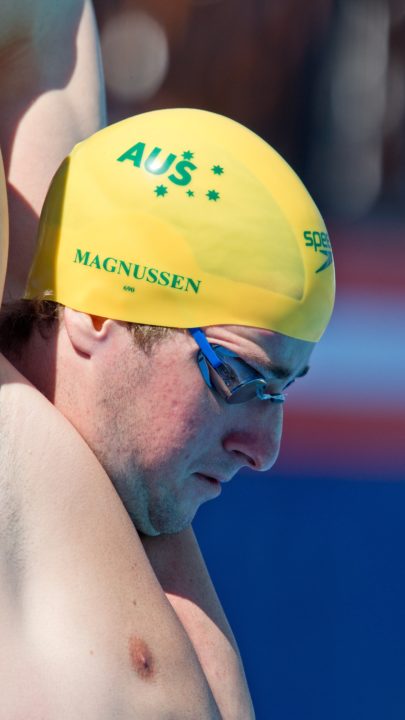Men’s 100 Fly – Finals
In the finals of the men’s 100 fly, Christopher Wright took the victory in a lifetime best of51.67, but he had a lot of ground to make up at the turn. That’s because Matt Targett went out in a 24.0, and looked like he might run away with the win. But Targett is truly a 50 butterflier, rather than a 100 butterflier, and couldn’t hold on to the lead. He finished 3rd in 52.24.
Wright was followed to the wall by 18-year old Jayden Hadler in 52.09.
Aside from Targett, and maybe even more surprising, Geoff Huegill also missed the top two, as he finished 5th in 52.50. He was the 2010 Commonwealth Games Champion in the 100 fly, and at 33 seemed to be the most successful of Australia’s comeback swimmers since the last Olympics.
Men’s 50 Free – Finals
Australia’s James Magnussen has taken the next step in his development, and has added a second individual event to his Olympic schedule.
Unlike at last year’s World Championships, where Magnussen swam only the 100 free individually, plus the two 400 meter relays, he will now be going after the 50 free as well in London. That’s thanks to his world-leading 21.74 in the finals of the men’s 50 free. The swim is about a tenth faster than he was in the semi-finals, and in total cut seven-tenths of a second off of his lifetime best in this 50 free.
He will be joined by former World-Record holder Eamon Sullivan, who touched 2nd in 21.92. After no Australians broke 22-seconds at last year’s National Championship meet, a third, Matthew Abood, actually did it here in 21.94. This meet shows where the progression of Australian sprinting really should be at, after it was a bit stunted seemingly by the disappearance of the rubber suits.
James Roberts, the man who chased Magnussen in the 100 free, was 4th in 22.31.
No surprise, but Targett scratched this 50 free to focus on the 100 fly. As a result, his only entry in London will be as a part of the 400 free relay.
Women’s 50 Free – Semifinals
Continuing the theme of the 100 and 200 freestyles earlier in this meet, this women’s 50 had an unbelievable cut-time to earn a spot in the final. It took a 25.14 to place in the top 8 and make the final (even without Sweden’s Therese Alshammar), meaning that a tie at 25.16 between Alexandra Purcell and Sophie Edington leaves them only as alternates.
The Campbell sisters took the top two seeds, with the older Cate Campbell touching in 24.55 for the top seed, and the younger Bronte Campbell swimming a 24.78. In Thursday’s finale, they will aim to be the first siblings in 40 years to make the Australian Olympic swim team. Close behind, though, is Libby Trickett in 24.86 – she continues to do what the Australian elder men couldn’t, which is improve in later rounds of the meet and pick up spots on the team.
Yolane Kukla (24.96) and Olivia Halicek (24.98) also broke the 25-second barrier.
By comparison, last year’s US National Champion, Lara Jackson, swam only a 24.99.
Alicia Coutts (25.13) and Marieke Guehrer (25.11).
Women’s 200 Backstroke – Finals
Australia’s Belinda Hocking, who at only 21 could be the elder statesman of the Olympic 200 back final, swam a 2:06.68 to win the 200 back, which is a new Australian All-Comers Record. That breaks the old record of 2:06.88 from last year’s National Championship meet. Hocking’s history says that she’ll be much faster than this time at the Olympics (as much as a second).
She will be joined in London by Meagan Nay, who was 2nd in 2:07.83. There wasn’t much suspense in this race, as Nay and Hocking got a lead early (almost two seconds ahead of third-place finisher Mikkayla Sheridan), and then just extended it for the rest of the race. Sheridan did, however, clear the A-cut in 2:10.33.
Women’s 800 Free – Finals
Another women’s freestyle event, and more crazy depth. The top four finishers all went under 8:30 in this race, but Kylie Palmer took the win in 8:26.60. That gives her a second win of the meet, on top of the 400 earlier, and a third total berth as she also finished second in the 200. That’s the second-best time in the world this year, behind only defending World Champion Rebecca Adlington.
Teenager Jessica Ashwood took 2nd in 8:27.97. In 3rd-place was Melissa Gorman in 8:29.73 and was actually in the thick of the race for a second spot, but in the last 150 meters couldn’t hold on (which is surprising, as she’s used to swimming races more than 10 times as long as this one). That is the first time she’s cracked 8:30, however, and she already has a spot on the Olympic open water team.
As American 15-year old Katie Ledecky stateside was wowing in distance freestyle races in yards, Australia’s own super-young distance swimmer Remy Fairweather finished 4th in 8:29.93. That broke the Australian National Age Record for 14-year olds by over two seconds, and broke a mark from 1989 held by Hayley Lewis. Lewis was a huge name in the early 90’s in Australian swimming, as she won 5 Commonwealth gold medals at only the age of 15 in 1990, and is now a major television personality in the country.
Full Meet Results available here.
